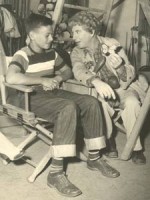Column Name
Title
At age 12, Bill Marx (’57, composition) got his first job: as prop man for his adoptive father, Harpo. From the 1949 show at London’s Palladium through their synergistic jazz albums for Mercury Records in the ’50s, father-son collaborations wove their careers together until Harpo’s death in 1964. In his recently-released book, Son of Harpo Speaks! (Bearmanor Media), pianist-composer-arranger Bill Marx, 71, shares intimate memories of the special bond that he had—and, he would say, still has—with both of his parents and his ever-evolving musical career with the “silent” Marx brother.
Body
How did your father’s musicianship affect the development of your own?
My dad had no training. He couldn’t read music. He loved listening to what we used to call avant garde and experimental music … My dad was way ahead of the game. He loved the French Impressionists. We shared that very, very closely … and so I got to hear Ravel, Debussy, Fauré, and all those guys—Honegger, down the line. He really opened my eyes to a lot of music in a very limited time frame, where you had to look pretty hard to find stuff, because it wasn’t as available as it is now.
Since your dad didn’t read music, how did you go about making arrangements for him?
I would write the notes out for him, but in letters rather than in notes. Then I would explain how I went about doing it, so that he could learn new songs for albums and for his guest appearances on television. I was 17 at the time [of his famous appearance on I Love Lucy] … I did the arrangement that he played [on his harp of] "Take Me Out to the Ball Game." By the time I was 16, I was his arranger/conductor, and we were doing albums for Mercury when I was 18 or 19 years old. I would come home [to California] from Juilliard and we would do an album and I’d go back, and then I would come home and do another one. In order for him to learn these things, I created this system of musical notation that would go horizontally and the harmonies would go vertically underneath.
After your father passed away, you performed some of the music you’d played together. What was that like?
I toured with a gal [harpist Carol McLaughlin] for a number of years. At the end of the show she’d put a Harpo outfit on, come out, and I’d put a Chico outfit on, and we’d do a duet—a musical duet … The minute that she got the Harpo outfit on—and I understood the same thing when I put the Chico outfit on—we went out on stage and we were no longer Bill or Carol … we no longer were responsible for any behavior whatsoever! It was liberating, absolutely. I really do believe that being able to be somebody else that you’re not normally, allows you the freedom of self-acceptance, in its own way, and I have to tell you that it was an eye-opener for both of us.
You speak quite candidly about your adoption story in your book, and the coincidence that led to your discovery of your birth family. Did that play a part in your decision to write your autobiography?
People had been coaxing me [to tell my story]… [but] the real story wound up being my relationship, both as a son and my professional relationship, with my dad … with a sub-story of the adoption. I gave people a different spin on who Harpo was as a father, not that crazy fella that ran around and did weird things for 50 years and made people laugh. He was just a regular guy, and I thought that was important for people to know … [The book] gave the flavor of what adoption is all about and at the same time it gave people an understanding of people who do adopt and who do nurture, such as my folks did with me and my two brothers and sister. To me, that was the essence of the book.





